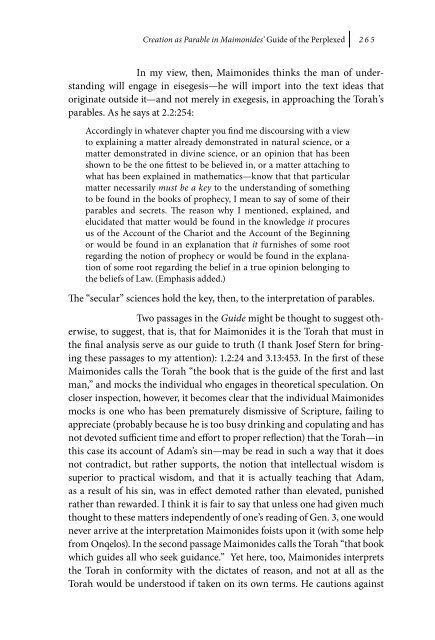Spring 2010 - Interpretation
Spring 2010 - Interpretation
Spring 2010 - Interpretation
Create successful ePaper yourself
Turn your PDF publications into a flip-book with our unique Google optimized e-Paper software.
Creation as Parable in Maimonides’ Guide of the Perplexed<br />
2 6 5<br />
In my view, then, Maimonides thinks the man of understanding<br />
will engage in eisegesis—he will import into the text ideas that<br />
originate outside it—and not merely in exegesis, in approaching the Torah’s<br />
parables. As he says at 2.2:254:<br />
Accordingly in whatever chapter you find me discoursing with a view<br />
to explaining a matter already demonstrated in natural science, or a<br />
matter demonstrated in divine science, or an opinion that has been<br />
shown to be the one fittest to be believed in, or a matter attaching to<br />
what has been explained in mathematics—know that that particular<br />
matter necessarily must be a key to the understanding of something<br />
to be found in the books of prophecy, I mean to say of some of their<br />
parables and secrets. The reason why I mentioned, explained, and<br />
elucidated that matter would be found in the knowledge it procures<br />
us of the Account of the Chariot and the Account of the Beginning<br />
or would be found in an explanation that it furnishes of some root<br />
regarding the notion of prophecy or would be found in the explanation<br />
of some root regarding the belief in a true opinion belonging to<br />
the beliefs of Law. (Emphasis added.)<br />
The “secular” sciences hold the key, then, to the interpretation of parables.<br />
Two passages in the Guide might be thought to suggest otherwise,<br />
to suggest, that is, that for Maimonides it is the Torah that must in<br />
the final analysis serve as our guide to truth (I thank Josef Stern for bringing<br />
these passages to my attention): 1.2:24 and 3.13:453. In the first of these<br />
Maimonides calls the Torah “the book that is the guide of the first and last<br />
man,” and mocks the individual who engages in theoretical speculation. On<br />
closer inspection, however, it becomes clear that the individual Maimonides<br />
mocks is one who has been prematurely dismissive of Scripture, failing to<br />
appreciate (probably because he is too busy drinking and copulating and has<br />
not devoted sufficient time and effort to proper reflection) that the Torah—in<br />
this case its account of Adam’s sin—may be read in such a way that it does<br />
not contradict, but rather supports, the notion that intellectual wisdom is<br />
superior to practical wisdom, and that it is actually teaching that Adam,<br />
as a result of his sin, was in effect demoted rather than elevated, punished<br />
rather than rewarded. I think it is fair to say that unless one had given much<br />
thought to these matters independently of one’s reading of Gen. 3, one would<br />
never arrive at the interpretation Maimonides foists upon it (with some help<br />
from Onqelos). In the second passage Maimonides calls the Torah “that book<br />
which guides all who seek guidance.” Yet here, too, Maimonides interprets<br />
the Torah in conformity with the dictates of reason, and not at all as the<br />
Torah would be understood if taken on its own terms. He cautions against
















